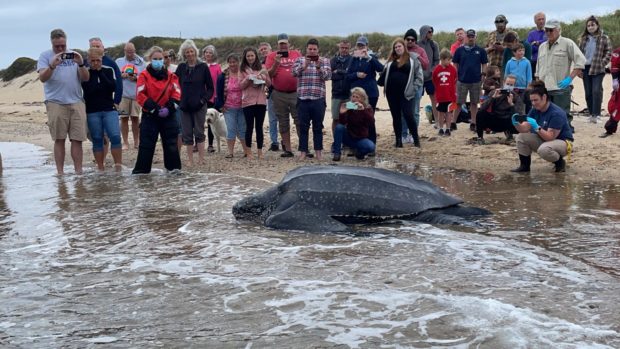A Six-Hundred-Pound Leatherback Sea Turtle, Stranded On Cape Cod, Was Rescued And Released Back Into The Ocean

Cape Cod, Massachusetts. On October 10, a six-hundred-pound leatherback sea turtle became stranded on Cape Cod. The adult male sea turtle was alive, alert, and stuck on a mudflat along the Herring River.
The Mass Audubon Wellfleet Bay Wildlife Sanctuary received the report first. The sanctuary’s director, Bob Prescott, worked with volunteers to ensure that the turtle did not drift away with the rapid tides.
“We wanted to keep it off the oysters and keep it from stranding somewhere that we couldn’t rescue it,” he said, “If it got away, there was no telling where it would strand next.”
After securing the leatherback’s location, the sanctuary contacted the International Fund for Animal Welfare (IFAW) as well as the New England Aquarium for help rescuing the turtle. This job could not have been completed alone.

Chee-Onn Leong – stock.adobe.com
Kira Kasper, a biologist for the Marine Mammal Rescue & Research Program at IFAW, said, “Our agencies work side-by-side on these shores- rescuing and protecting local species. So we jumped at the chance to help with responders, equipment, and transportation.”
Safely relocating a turtle this massive, which clocked in at five feet long and six-hundred pounds, requires a “specially designed heavy-duty transport cart, stretchers, and mats.”
These tools were initially designed for moving small whales and dolphins.
After IFAW assisted in the relocation, Dr. Charles Innis- the director of animal health at the New England Aquarium- took over.
He assessed the turtle’s health by taking blood samples, administering injections/vitamins, and a nonsteroidal anti-inflammatory drug (NSAID).
Sign up for Chip Chick’s newsletter and get stories like this delivered to your inbox.
“Our initial evaluation indicated that the turtle was very strong and in good body condition, and this helped us to decide that it was a good candidate for release,” Dr. Innis concluded.
The leatherback received small identification tags- including a microchip, metal band, acoustic, and satellite tags- before being released back into the ocean.

IFAW; pictured above is the turtle that was rescued
The turtle was cheered on by the community as it waded its way into Herring Cove in Provincetown.
The aquarium will be tracking the turtle- via the satellite tag- to ensure its survival over the next thirty days. The acoustic tag will also allow the aquarium to track the turtle’s migratory patterns for the next five to ten years.
Dr. Kara Dodge, a research scientist at the Aquarium’s Anderson Cabot Center for Ocean Life, believes this sea turtle’s robust health was a miracle.
“When working with stranded sea turtles in New England, it’s a rarity to have a turtle that is in such good condition… we feel optimistic that it will survive, thanks to the collective rescue efforts of this fantastic group of colleagues.”
More About:Animals





